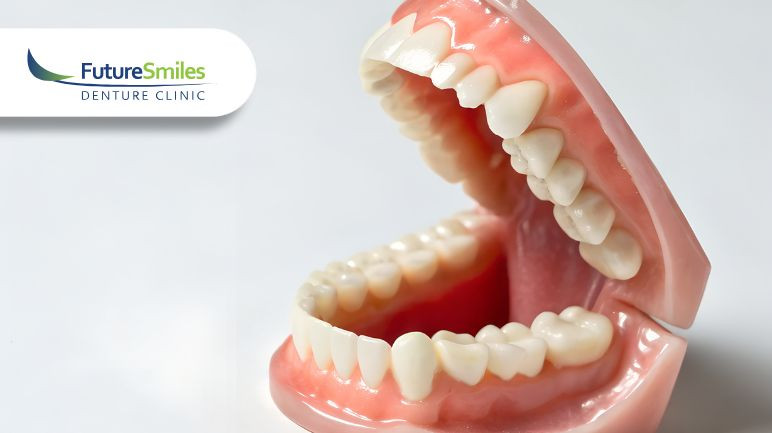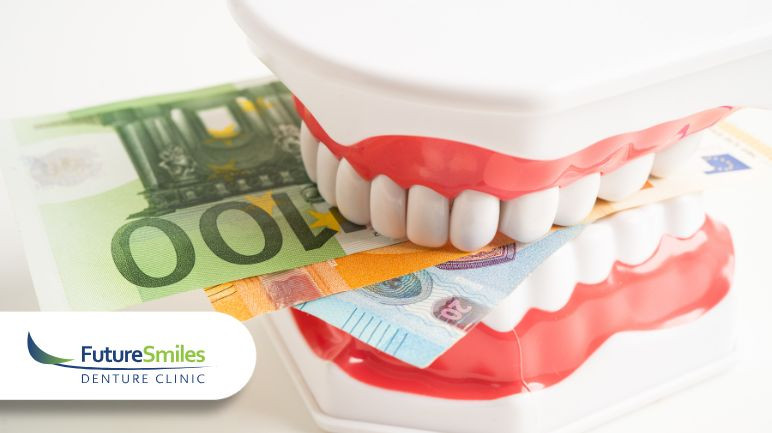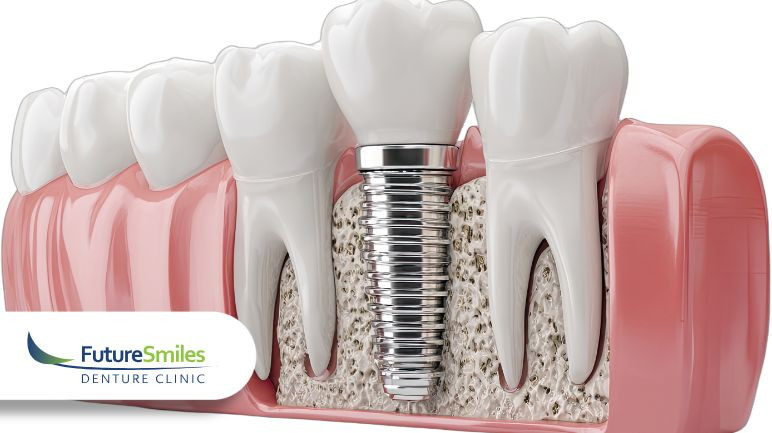Dental implant failure is rare but can happen and has some tell-tale signs. From pain to red and swollen gums, here’s when you know you need to visit your denturist.
Dental implants are one of the most advanced and innovative tooth replacement options today and give patients enormous benefits over traditional tooth replacements such as full and partial dentures.
These include:
- natural look
- comfortable
- better speech compared to dentures
- better eating habits
- keeps your jawbone intact
- easier to take care of than dentures
Affordable Dental Implants in Calgary
At Future Smiles, we believe that every patient has the right to a beautiful and healthy smile. We offer high-quality and affordable tooth replacement options to meet all budgets and lifestyles, including dental implants, traditional full dentures, and flexible partials.
We also offer home calls and flexible payment options to ensure that every step of your tooth replacement journey is easy and seamless.
What Causes Dental Implant Failure?
Dental implant surgery is one of the most successful and predictable surgeries in dentistry, largely due to the fact that implant technology is so advanced (both in terms of procedure and material), which translates to a low failure rate.
However, dental implant failure can happen from time to time due to several reasons, including:
- Early implant rejection - This happens before the bone finishes healing and is most often due to the body rejecting a foreign substance or reacting to a metal allergy.
- Late implant rejection - Implant failure can happen after the bone heals due to factors such as unsatisfactory home care, post-op trauma, and even smoking.
- Older implant model - Older implants can also fail, especially if they were put in before technology was as advanced as it is today.
- Poor dental hygiene - Although dental implants are not susceptible to decay, patients must consider the bone support factor. Improper oral hygiene can lead to infections around the implant, which will be detrimental to its longevity.
Although the risk of dental implant failure is rare - the average success rate being 95%-98% with a skilled dentist/denturist - patients must always discuss their role in minimizing the risk of failure with their dental health care professional long before surgery.
3 Signs of Dental Implant Failure
Even though dental implant failure is very rare, it does come with some telltale signs that you should always be aware of. If you are experiencing any of the following symptoms, it’s important to visit your dentist/denturist as soon as possible.
- Pain or discomfort - Though pain is part of the dental implant healing process, it shouldn’t persist for very long after your procedure. If your discomfort extends beyond two weeks, it’s important to visit your denturist immediately.
- Swelling, inflammation, or bleeding - Red and swollen gums are often a sign of gum infection. Since infections often accompany implant failure, it’s best to get your gums and implant checked out the moment you experience these signs.
- The dental implants are feeling loose - If your implant feels loose or unstable, or feels like a foreign object in your mouth, then you should not ignore it.
How to Reduce Your Risk of Implant Failure
Dental implants are one of the wisest investments you can make for your oral health. Not only are they designed to last your lifetime, they have an extremely high success date (up to 98%). To reduce your risk of implant failure, it’s important to take the following steps:
- Select the right denturist - One of the surest ways to have a successful outcome is by carefully selecting your denturist. Not only will they need proper training and experience to select the correct type of implant, he/she needs the skills to place the implant with precision.
Choosing A Denture Clinic - Stop smoking - Smoking creates a greater risk of implant failure because the chemicals in cigarette smoke dry out the gum tissue, so they don’t heal as well. The longer it takes for the gums to heal, the greater your risk for infection to set in.
- Deal with any night-time grinding - If you have worn, chipped, or broken teeth, or suspect you grind or clench during sleep, discuss this with your oral health care professional before treatment begins so you can resolve the problem and ensure it doesn’t affect your implant success.
Call Today
To find out more about the costs and benefits of dental implants, or to learn more about caring for your replacement teeth, contact our Calgary denture clinic today at (403) 475-0016 or book a consultation.






